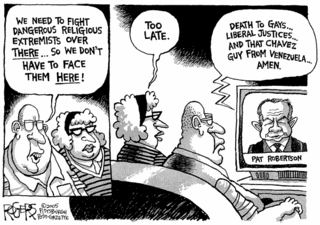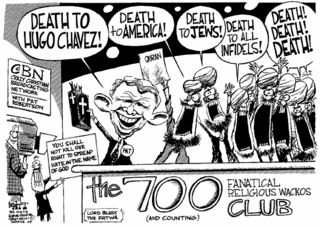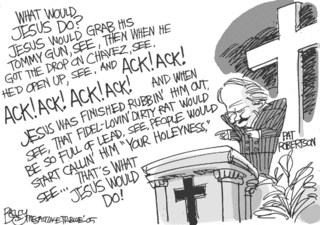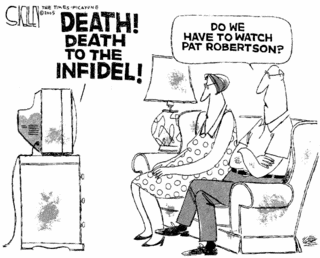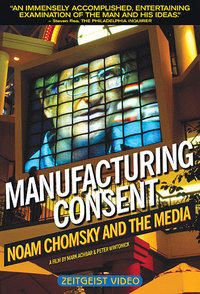
Today I watched a very thought-provoking documentary called
Manufacturing Consent: Noam Chomsky and the Media, which is based on Chomsky's
book . In the documentary the argument is put forth that the media serve and further the goals of the dominant groups in society, namely the wealthy and powerful. But this is not presented as some giant, secret conspiracy, but as naturally following due to the fact that the media is a business whose goal is to make a profit. This profit-incentive, as well as other factors, drive the media to form public ideas and present issues in such a manner as to serve the interests of the powerful. These biases are explained by what Chomsky and Edward Herman call the
Propaganda Model. The theory explains that there are five "filters" which the news must pass through in order to "become news", and these filters select only information that is not at odds with the well-being of those in power.
These five filters are, courtesy of wikipedia,
- Ownership-Herman and Chomsky argue that since all mainstream media outlets are large corporations which are themselves part of bigger conglomerates, e.g. Westinghouse or General Electric, which extend beyond traditional media fields, these companies have powerful interests that may be affected when certain information is publicized. According to this reasoning, bias against that news which conflicts with the interests of those who own the media is to be expected.
The authors claim that the importance of ownership filter is the fact that corporations are subject to shareholder control in the context of a profit-oriented market economy. The theory then argues that maximizing profit means sacrificing news objectivity, and news sources that ultimately survive must be fundamentally biased, with regard to news in which they have a conflict of interest.
- Funding-The authors also argue that the mainstream media depends heavily on advertising revenues to survive. A newspaper like the New York Times, for example, derives 75% of its revenues from advertisements.
The authors suggest that this filter is best seen by adopting a traditional business framework. They argue that a newspaper, like any other company, has a product which it offers to its audience (or customer base). In this case, however, the product is composed of the affluent readers who buy the newspaper — who also comprise the educated decision-making sector of the population — while the audience includes the businesses that pay to advertise their goods. According to this "filter", the news itself is nothing more than "filler" to get privileged readers to see the advertisements which makes up the real content, and will thus take whatever form is most conducive to attracting educated decision-makers. Stories that conflict with their "buying mood", it is argued, will tend to be marginalized or excluded, as will information that presents a picture of the world that collides with advertisers' interests.
The theory argues that the people buying the newspaper are themselves the product which is sold to the businesses that buy advertising space; the newspaper itself has only a marginal role as the product.
- Sourcing-The third filter argues that the mass media need a constant flow of information to supply their daily news demands. In an industrialized economy where consumers demand information about multiple global events, they argue that this task can only be filled by the business and government sectors which have the necessary material resources. This includes mainly The Pentagon and other governmental bodies. Chomsky and Herman then argue that a "symbiotic relationship" arises between the media and parts of government which is sustained by economic necessity and reciprocity of interest. On the one hand, government and news-promoters strive to make it easier for news organizations to buy their services; according to the authors, they
* provide them with facilities in which to gather
* give journalists advance copies of speeches and forthcoming reports
* schedule press conferences at hours well-geared to news deadlines
* write press releases in usable language
* carefully organize their press conferences and "photo opportunity" sessions
On the other hand, the media becomes reluctant to run articles that will harm the corporate interests that provide them with the resources that the media depends upon.
These last two filters are those which are presumed to be of lesser importance
- Flak-The term "flak" has been used to describe what the authors see as targeted efforts to discredit organizations or individuals who disagree with or cast doubt on the prevailing assumptions which Chomsky and Herman view as favorable to established power. Unlike the first three "filtering" factors, which are derived from analysis of market mechanisms, flak is characterized by concerted and intentional efforts to manage public information. Flak from the powerful can be either direct or indirect. The direct would include letters or phone calls from the White House to Dan Rather or William Paley, or from the FCC to the television networks asking for documents used in putting together a program, or from irate officials of ad agencies or corporate sponsors to media officials asking for reply time or threatening retaliation. The powerful can also work on the media indirectly by complaining to their own constituencies (stockholders, employees) about the media, by generating institutional advertising that does the same, and by funding monitoring or think-tank operations designed to attack the media. They may also fund political campaigns and help put into power politicians who will more directly serve the interests of private power in curbing any deviationism in the media.
- Anti-ideologies-A final filter is anti-ideology. Anti-ideologies exploit public fear and hatred of groups that pose a potential threat, either real or imagined. Communism once posed the primary threat according to the model. Communism was seen by its detractors as threatening freedom of speech, movement, press etc. and that this was often used as an excuse to silence voices critical of power. With the destruction of the Soviet Union, proponents of the propaganda model have argued that the main emphasis of anti-communism, has been lost. New anathemas soon appeared. Chomsky and Herman argue that a possible replacement for anti-communism seems to have emerged in the form of "anti-terrorism".
So that's essentially the theory behind it, and in my opinion it is pretty straight-forward. Chomsky points to some examples in this documentary and there are also some great examples on another documentary called
The Corporation . I think you'd be surprised as to what extent the media collaborates with its advertisers when their advertisers have something they don't want published. An example from
The Corporation is rather poorly described
here.
Anyhow, I highly recommend both of the documentaries. You might be able to rent them at your local video store (as I did with The Corporation) or view them at a university library (Manufacturing Consent). I think too often we, as atheists, think that we've seen through all the bullshit and aren't being misled anymore. I'm starting to think that perhaps that view is incorrect.

